#and an adaptation that understands its source material
Explore tagged Tumblr posts
Text
cassandra & clytemnestra
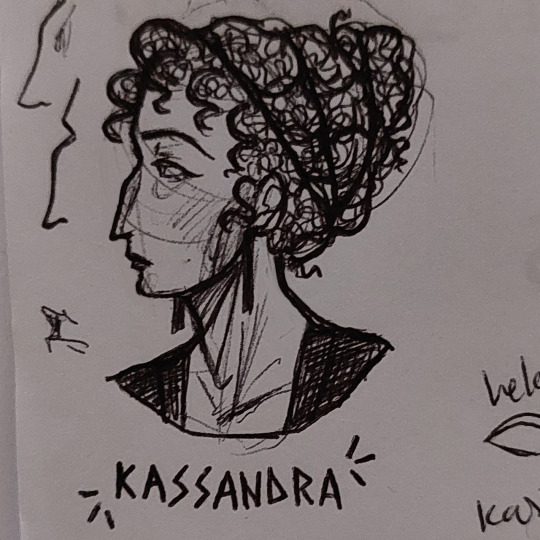
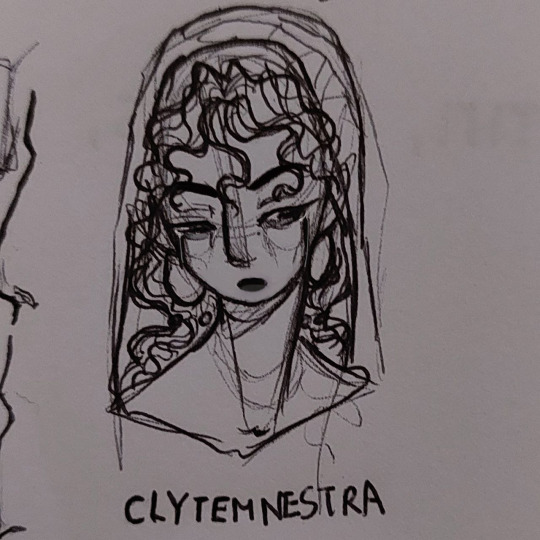
class doodles <3
cassandra: super proud of how she turned out!! i love noses so much and ive managed to give her a really glorious one today. she got a few compliments too hehe
clytemnestra: idk how well ive managed to depict it lol but cly is both mourning iphigenia and planning out her vengeance. its going to be a long 10 years but she will have her killers blood.
--
i still have a long way to go till i finish the iliad so i dont know everyones story yet, i do know however that cly like many before and after her arent often portrayed with the complexities that make them them, that make them human, but instead as paragons or pariahs. and i think theres lots to be said on the matter, but i dont want to get ahead of myself lol. anyway enjoy :D
#cassandra#cassandra of troy#kassandra#greek mythology#paris the musical#the iliad#my muffin#i love her so much#yall dont even know#clytemnestra#tragic mother figures of the mythos#they could never make me hate you#as i understand it she neglected her kids in favour of iphigenia. which isnt great parenting#so she isnt free of sin#and yet between her and agamemnon its quite clear who ruined more lives.#or is it?#(or is it?)#jokes aside lol#im still reading & learning but there seems to be a big divide between the mythos and modern perception#influenced by pop culture and adaptations sure but also a lack of critical thinking and the innitative to go fact check for oneself#which is several essays on its own lol#kinda lost where i was going with this :')#✨nuance✨#and go read the source materials pls#godbless#my art#my ramblings#everyone is entitled to their opinion#this is (part of) mine#pls feel more than free to share ur own thoughts and stuff
113 notes
·
View notes
Text
Me, a The Wonderful Wizard of Oz (1900) fanatic watching Wicked say that Galinda is from the North (she's the Witch of the South), Fiyero is a Winkie prince (the Scarecrow was from Munchkinland) and Boq is a Munchkin (the Tinwoodsman is a Winkie named Nick Chopper)
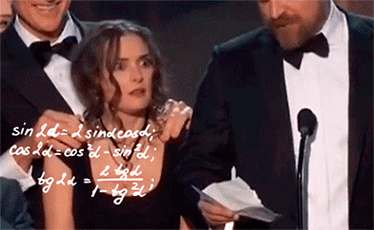
#not a criticism#i understand its an adaptation five degrees from the source material#and glinda being north is a 1939 move change#and boq and fiyero are changes from the gregory maguire book#wicked#the wizard of oz#the wonderful wizard of oz#wizard of oz truther#wicked spoilers#wicked part 2 spoilers
19 notes
·
View notes
Text
I cannot stress this enough, but using The Untamed/CQL to “contextualize” the novel mdzs is like using the movie Percy Jackson and the Lightning Thief (2010) to understand the Percy Jackson and the Olympians book series. American readers know…
#mdzs#i don’t understand how in american book culture#it is common knowledge that a tv or movie adaptation of a book#is almost always gonna irreparably fuck up the book’s story and lessons#and even in anime fandoms#i feel like it is generally understood that rhe anime adaptation of a manga#is gonna eventually diverge from its manga origins to end somewhere entirely different#the only thing the sources and their adaptations will have in common is character and place names#(if even…)#so why can this not be understood#when people say that knowing cql is NOT the same as knowing the book?#that the things that happen in the drama are almost entirely removed from the book’s story?#if you wanna understand the book#you actually have to read the book as the source material#and not as a supplementary addition
55 notes
·
View notes
Text
yknow i get that people have preferences especially with the vast amount of holmes adaptations out there but i would prefer not to see bbc adaptation hate when looking for content !
#notepad#also a lot of people use the criticism that hes just an asshole in the show which is different from the books#… did we forget that hes autistic coded. did we forget he has issues with social cues and figuring out if something is ok to say or not.#did we forget that a Lot of autistic people feel this way too. and that by saying this we can make those autistic feel bad about something#that they cant control because they struggle to understand it.#(i am one of those autistic people can you tell.)#also its an adaptation for a reason. not everything is gonna be the same as the source material
3 notes
·
View notes
Text
I feel like people would enjoy adaptations of books/animation a lot more if they looked at them like professionally produced fanfiction rather than as Thing I Like: Redux.
#my critera for what makes a good adaptation:#does it expand on something that was perhaps underexplored in the source material?#does it show a good understanding of what parts of the characters/narratives/themes are structural?#is it a labor of love? can i tell this is a passion project for some or all of the people working on it?#can it stand alone as its own piece of art for people new to the material while being deepened/enhanced by being familiar with the source?#adaptations#books#movies#shows#live action#animation
2 notes
·
View notes
Text
AMC’s IWTV…could be TV show adaptation of all time but also!!

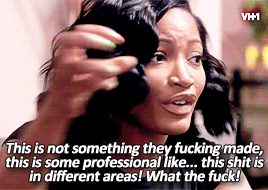
5 notes
·
View notes
Text
I'm serious when I say; you can tell with comics, whether it be the book or any sort of adaptation (though ESPECIALLY with film and TV adaptations), you know whose a fan and who is doing this to check off a box for the next thing or because they think everything needs to be edgy.
And the work severely suffers when it's the latter and it's draining at this point.
#kenz musings#dc comics#marvel comics#looking at you dark knight trilogy#and mcu#and the batman#controversial take there ik but that was NOT riddler. they jammed a bunch of true crime cases and made him a joker rip off from what i saw#i refused to watch that movie bc i could tell instsntly between that and making bruce angry and brooding and looking ready to punch everyon#that they didnt understand nor care about their source material#also half of the other dc adaptations lets be real#i can list what movies and tv series Got It#no surprise there tho its a lot of the animated projects#also alternatively sometimes the casting makes ir#i love the first 3 xmen movies. sometimes they dont full encapsulate the comics energy.#but they had some damn good casting choices for logan charles erik hank ororo scott and jean
4 notes
·
View notes
Text
Luffy being THE MOST excited when Sanji said he would join up XD
It was so damn charming. And y’all were right. Sanji really has been looking at Luffy with love in his eyes.
Also Luffy being the most devastated with Zoro injured. Y’all ZoLu stands being fed muchly.
Baratie arc definitely had the most changes done to it so far. They shed a lot of Sanji’s introduction in favour of getting Nami’s arc going. Which makes sense because we all know Sanji has his Moment much later in Whole Cake, but I loved Baratie so much bc it was about two people who faced a trauma together and built themselves from the ground up and it was only ever with love that Zeff was so hard on Sanji. And Baratie became a home for similar pirates who all had love for Sanji bc they could all see his potential and his future and knew his talent was being wasted. So they treat him like he’s a beginner chef that has no place at Baratie to push him out the door but in the end Sanji hears how much they love his cooking and feels so validated by it. Rather than it being about Sanji being super fancy with his meals and being stifled by that.
And not to say that the Baratie LA version doesn’t hold a lot of that core message, but you could never have Whole Cake without Baratie yknow? Know who Sanji became before you know how he got there.
And they still the big tearful farewell with Zeff and it makes sense for the LA and I did enjoy it but I would’ve loved him to do the dogeza thank you. One of my favourite Sanji moments. Because he reciprocates that gratitude and love back in the most respectful sense (especially after all he does is cuss out Zeff and the other cooks).
All that said, I still enjoyed the LA Baratie arc. It still kept a lot of the core themes from the source material while still holding its own within the story that surrounded it. I like that they’ve pulled back Sanji to really what he was in the beginning. Yes he’s a lady-dazed fool but he was very grounded and charming and cool in the beginning. It was only later that he started to lose his mind over women.
The only thing I have is that Mihawk was like “oh Luffy is interesting and I wanna see what he can do” which didn’t feel earned yet. His major interaction was with Zoro and he had a maybe 1 minute conversation with Luffy. And suddenly he’s like “oh this kid might get the one piece so it’s worth it to antagonise the marines who sent me after him”.
That part felt a little fast and loose. In the source material, Luffy had defeated Don Krieg and he had held back anyone from interfering with Zoro’s fight and he had allowed Gin to leave with Don Krieg. Mihawk took all that in mind and then left Zoro and Luffy alone. Here, Luffy was sidelined a lot. If Mihawk had been present for Luffy’s fight with Arlong, then I could probably understand his line of thinking.
So yeah.
#one piece#one piece live action#I’m trying to balance comparing it to the OG and understanding that an LA is an adaptation#an adaptation greenlit by its creator nonetheless!#but I’m not here to say it’s perfect or villainise either#I think it’s the best LA adaptation we’ve gotten#and one of the most impossible anime’s to adapt as well#the amount of doubters when this was first announced was insane and I was definitely one of them#but it has proven to be very full of heart and sincerely made and quite well executed#but like any media there are bound to be faults and I’m not gonna hold back if I see them#some of these faults will inevitably be ‘on the manga/anime did it better’ !#bc how can I not when the source material is right there#but I’m also taking it at face value as a media for consumption#spoilers#manga#anime
5 notes
·
View notes
Note
i hope this isn’t too weird of a q, but given the series is so popular with lesbians (hi!!!), are there any characters you’re envisioning as lesbians/wlw over others? i’ve struggled with writing wlw chars in tumblr groups in the past because they get ignored a lot of the time, so i figured i would ask. either way i’m so excited for this group, i’m a major fan of tlt and screamed when i saw your ad for it. 🫶
Definitely not a weird question! It’s actually probably my favourite question I’ve ever been asked. I started reading TLT because it was advertised to me as space lesbians and getting to read a piece of work by a lesbian who was so unabashedly proud of her sexuality in an age when online fandoms don’t prioritize or even care for sapphic characters was so refreshing (and then to have the fandom reflect that as well!). I digress— there’s a few. Both of the Third House (who both got written to Ptolemaea by Ethel Cain on repeat) and Seventh House are the biggest standouts. The bond especially between the Seventh is one of my favourites (and I am so excited to see them published tomorrow) and I did write them as butch-femme (if I close my eyes, this is them). In my heart of hearts, the Fourth Cavalier is just because it means that the BOE is mostly recruiting lesbians to their cause. And naturally the Ninth House I had to write as an lesbians. The Nonagesimus line is not producing hetrosexuals. While I don’t want to deter anyone applying for these characters from applying as any other gender (or from applying as a lesbian to a different character— these would all make very good lesbians!!!), these are to me, my silly little wlws.
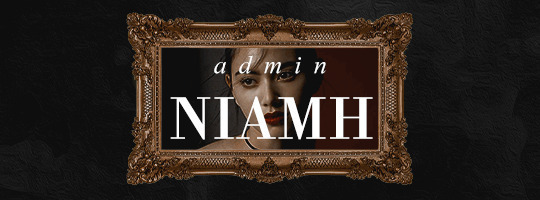
#skeleton rp#semi appless rp#horror rp#lsrpg#literate rp#i know this will get buried in the tags a little but i do just want to say how much i understand what u mean abt being ignored writing wlw#characters and how easily isolating it can be. its an experience ive unfortunately had many times as well & that despite tumblr branding#itself as the queer website or groups saying they're friendly to wlw but its always felt otherwise. i know i'm bias when i say i want#to prioritize wlw characters (especially woc) because that is the source material i'm adapting but more so because theres so few sapphic#spaces in the rpc. i really hope to be able to foster an environment that stubbornly loves lesbians. i'm trying to stop myself from ramblin#but it is why i love tlt and its unabashedly weird lesbians who are doing all kinds of things. good queer rep isn't theyre all perfect#sometimes they're gesus and her lobotomy nun and her situationship with a cannibal AND her other situationship with freezer babrie#admin: niamh#ask#anonymous
0 notes
Text
casting bill skarsgard as "hot nosferatu" is ??????? because dracula's whole thing is that he's supposed to be a sexy older man. bill is too little. but if they're just trying to copy nosferatu and not dracula as a whole, how are they gonna make him not an antisemitic caricature. mr eggers I have questions and concerns
#I love the og nosferatu but#i don't understand why you would choose to remake the unauthorized adaptation instead of just straight up using the source material#like maybe we've had one too many dracula movies but name-swapping the characters#just seems like you're trying to get film nerd brownie points#“super historically accurate and disturbing dracula by robert eggers” would've been a good enough sell on its own#that would've still allowed creative liberties and inspiration to be taken#....... hm we'll see#I'm just being a hater like always
0 notes
Text
Dungeon Meshi Episode 7 was super interesting from an adaptation standpoint - this'll be a little different from what I usually write about (though I do still talk about the animation in the full video).

Studio Trigger have never done a straight-up manga adaptation before - and led by Yoshihiro Miyajima, a big fan of the manga who pushed hard for the adaptation to get made, and who has never directed a full series before, it was unclear if they'd be able to find the right balance between a simple panel-for-panel recreation and making something that's completely different.
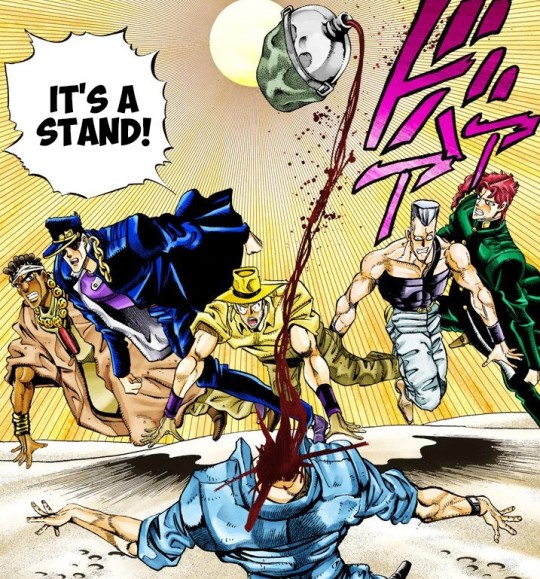
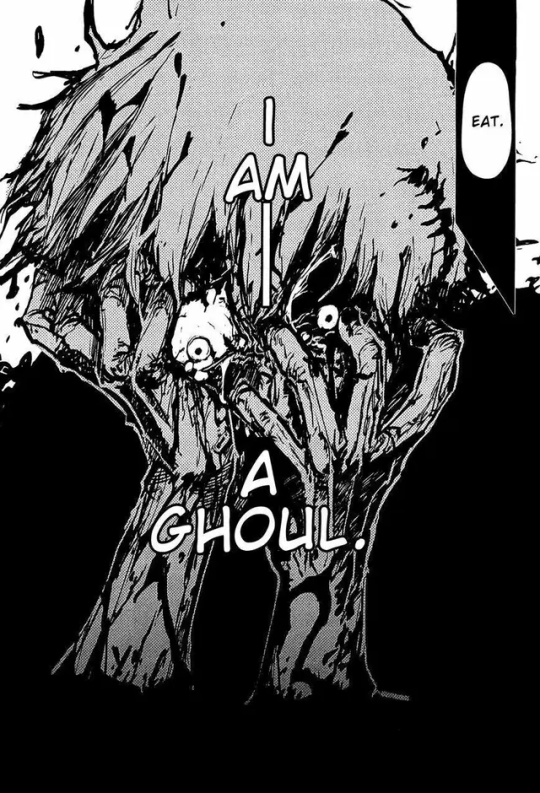
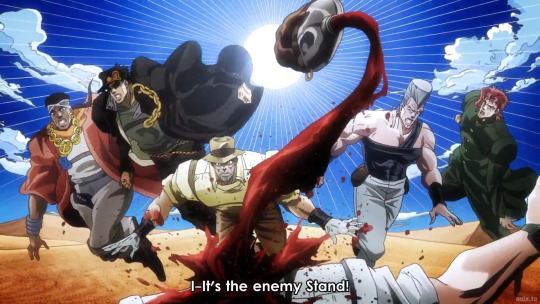

And in the first few episodes, you could really feel the tension between the influence of a cautious young creative with great respect for the source material, and a studio with a unique established visual style. It kinda seemed like they were ping-ponging willy-nillily between the two sides of that spectrum.
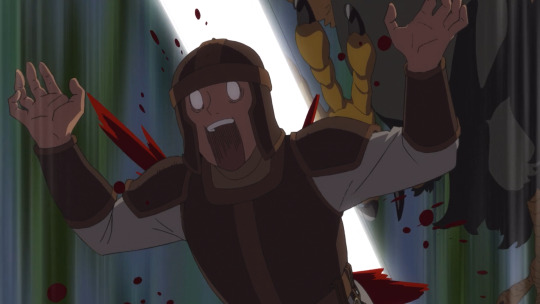
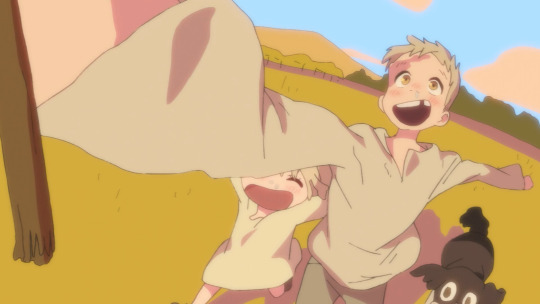
But this episode showed that Miyajima (and series writer Kimiko Ueno) can take 3 chapters, slice them up and rearrange them into a cohesive-feeling episode while taking into account the differences between screen and page, and using them to their advantage.
Starting with the way the water looks. This line from the manga describes a faint magical glow to the water in this lake and you can see that the cavern fades into darkness above, but Kui's illustration style doesn't really define lighting and shadows very much compared to the cel-drawing style of animation. So the animators took the opportunity to use the water as the light source, and make a whole episode that's lit almost entirely from below. It really gives an otherworldly feeling to this area.
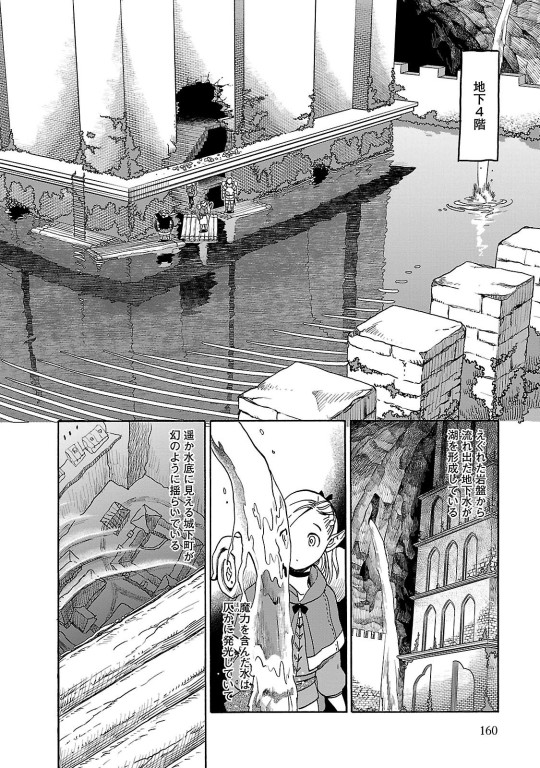
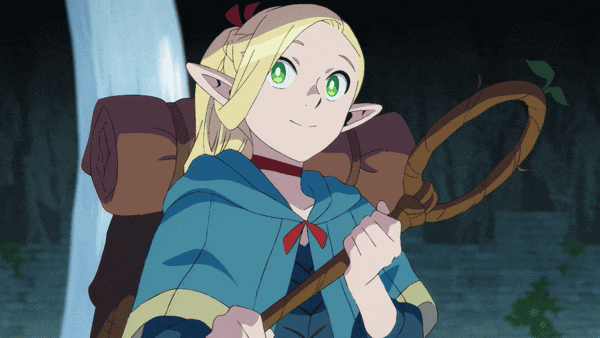
Particularly when the Kelpie shows up, that under-lighting works wonders to define its anatomy within the relatively simple line art.
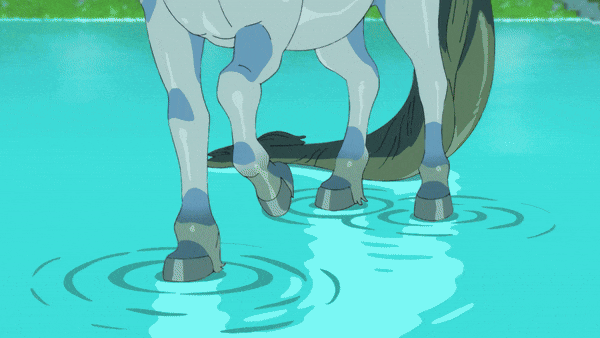
What do you do when you can't show the immense fuck-off scale of a monster with a beautiful full-page spread like this?
Well you use what you do have: the ability to move the camera instead. This is such a great way to communicate the scale of this thing, AND such a great way to show some of Senshi's anime-original butt-cheeks!
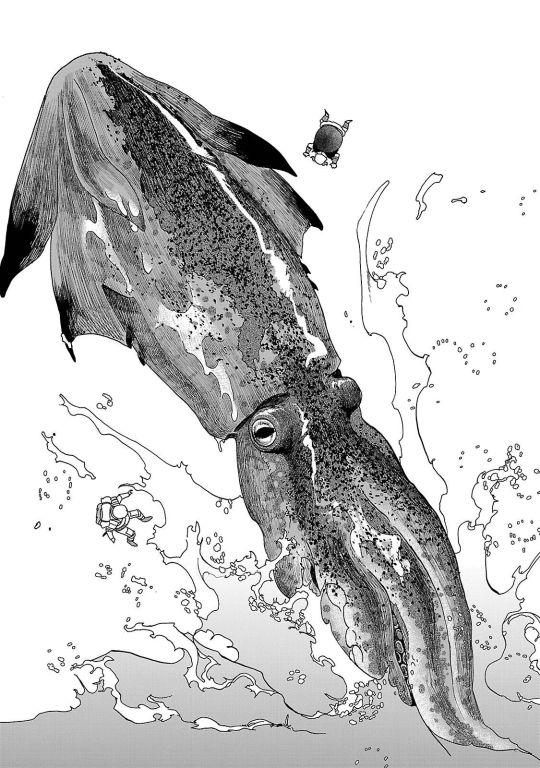

This is one of my favorite shots from this episode - this whole sequence is super hectic, cutting quickly from character to character, but they use tricks like this to keep you from getting confused. This is framed much like it is in the manga, but with the moving image, they're able to use the trajectory of the fish head in the background to lead your eye directly from Chilchuck, right to the point where Senshi pops up in the foreground and transition seamlessly from one character to another!
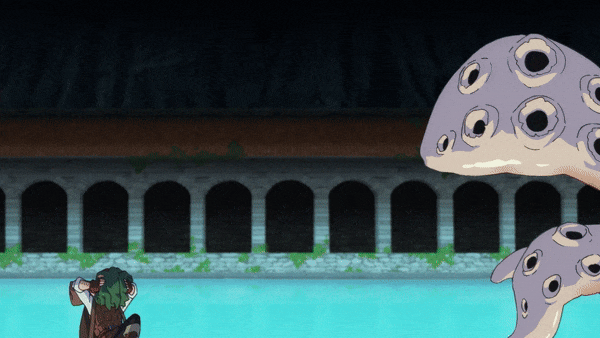
Now, it's not all good - I am a bit disappointed that they removed Marcille's own Senshi-style soap-making montage, which was the perfect visual representation of the culmination of the character development and understanding built between Senshi and Marcille.
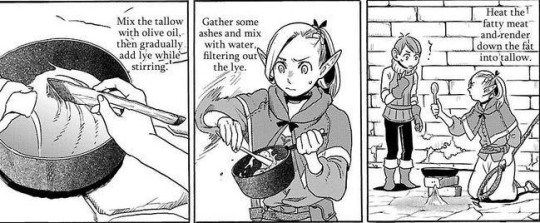
It's a shame to see it go.
I get more into that, what else was cut, and much more in this video where I broke down the entire episode!
Check it out if you feel like it. If you don't, jump in a ditch, cover yourself in leaves and jump out at people as they walk by.
Thanks for reading!
youtube
#dungeon meshi#anime#manga#laios touden#marcille donato#senshi#delicious in dungeon#video#mini essay#original
6K notes
·
View notes
Text
pac: how do people around you see you?
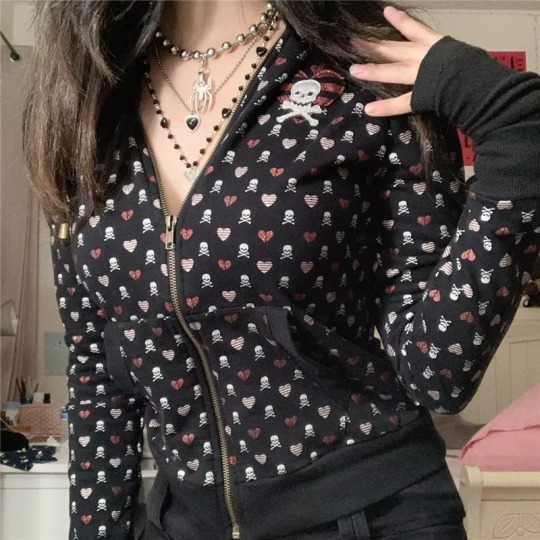


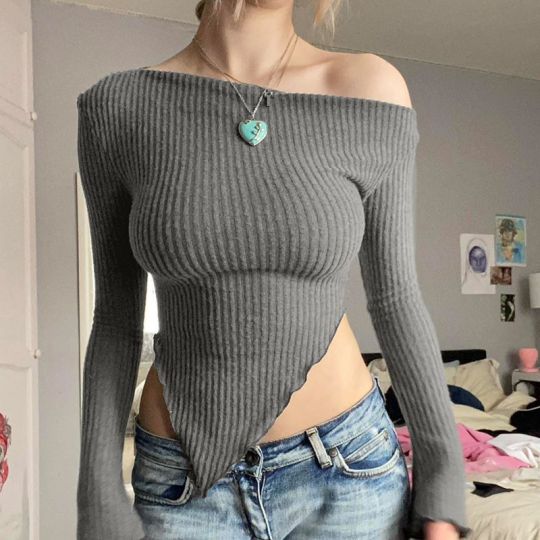
general reading. pick a pile, listening to your intuition. if nothing resonates, leave this pac behind.

pile 1
soft and sharp, warm and cold, changeable, but combining opposites so harmoniously. you have the ability to hide secrets inside and surprise others with little unusual bits of your personality. you have an inner stability, the ability to accept the twists of fate and use them to your advantage. people think that in feelings you give yourself to the bottom, both good and bad. some people find you too authoritarian, but you have a natural ability to make (or advise) others to do what you need or want. despite the general impression, some see your fragile spiritual core, and some may even say that you give them your light. even if you do not plan to illuminate someone's life, it happens on its own. many people do not strive to see beyond the facade that you have erected and may not realize that you can hide wisdom, knowledge, depth of words behind jokes and light-mindedness, a mask that you deliberately put up for others.
pile 2
others see you as a loyal, hardworking person, although not without a hint of something… gloomy? not hostility, but something dark or gloomy. you work even when obstacles arise, your persistence is admired by others, maybe even became an example or a source of inspiration for someone. at the same time, a special feminine energy emanates from you - cool, fresh, even a little youthful. energy that attracts, like a flower in the morning dew, but not everyone likes it. in general, you give the impression of someone who is difficult to gain trust, you don't let everyone in your inner circle, some think that you are too difficult to find the keys to. I think they just do not realize that you choose people based on your emotions and your inner circle is so important to you in order to develop, learn and work on yourself.
pile 3
some people think that you are capable of doing anything with your own hands. every little bit of what you do - art, handmade, cooking, whatever - has a special uniqueness, everything is a meaningful masterpiece. people see great wisdom in you, even when your words are not liked or seem poisonous. in addition, you know how to use all your knowledge for good. some people think that you are overprotective? the energy of excessive care, maybe even an attempt to prove that your views on everyday life and the material world are the most correct. someone may think that you were greatly influenced by your ancestors, and that is why your advice, even when you talk about something modern, can be perceived as outdated, similar to ancient wisdom. they are never devoid of meaning. few will be able to understand that helping others and caring that you do is not your favorite thing or a way to show yourself. these are just intuitive actions.
pile 4
the energy of an intelligent but closed person. clearly with a mind of your own, with clear internal and external boundaries. do you like black humor or sarcasm? or maybe there are notes of healthy cynicism in you? people sense that there is a storm of energy hidden inside you, it seems to them that your inner strength and impulses are more than enough for your desires and goals. for the sake of your goals, you can be assertive, choose smart paths and apply your efforts correctly. but others think that you are too free with your time, as if you own it. and some catch too many flirting signals. there is something in your behavior that reminds them of a socialite. to someone you may even seem frivolous in those moments when you deviate from your mask and image. someone notices that you often change your habits, style, lifestyle, and not everyone will understand that this is not a burden, not forced. you are able to adapt to any physical changes, from food and apartment to clothes, workouts and weight. it's like you are changing subtly every day. just don't pay attention if someone ignorantly considers it insignificant.

thanks for the reading!
dividers by @strangergraphics-archive, all images are not mine
639 notes
·
View notes
Text
wicked proved something that i and most people who like specific niches already understood but hollywood seems to not get: in order to direct a project that originates in media with a very specific language, you need a team who understands both the language of the original text and the language of the media it’s being translated to. you may be an incredible film director but if your style is gritty realism there is no reason why you should be directing a film based on musical theatre, one of the forms of media that requires the most suspension of disbelief from its public - and one that gets it very easily because such is simply the nature of it, unlike film. if you are directing a period piece, you need to understand what about the source material was so interesting and fresh that people are still talking about it decades later and translate that interest to screen - otherwise it’s just people in old timey clothes, not an adaptation. successful properties with established fandoms like that thrive because of the medium they use, not in spite of it - you need to respect and like that about them, otherwise your take on it is always gonna be lacking
904 notes
·
View notes
Text
Serialised Sherlock Holmes adaptation which meticulously reproduces all of Arthur Conan Doyle's continuity fuckups, at first seemingly out of excessive concern for fidelity to the source material. Eventually, it's revealed that we're actually looking at a pair of extremely similar parallel universes, each with its own almost-but-not-quite-identical Holmes and Watson duo, played by the same actors.
In the back half of the series, a plot by Time-Travelling Omni-Moriarty threatens both universes, obliging the Holmeses and Watsons of each universe to team up with their counterparts to stop him; the particulars of this portion of the story are such that understanding what the hell is going on critically hinges on the audience's ability to keep track of which nearly-identical Holmes or Watson is which.
The ultimate resolution involves outsmarting Moriarty by having the Watson with the war wound in his leg and the Watson with the war wound in his shoulder secretly switch places, deliberately framed in such a way that, as far as the audience can tell, there was no conceivable opportunity for them to have done so.
#concepts#media#literature#sherlock holmes#arthur conan doyle#adaptations#metatextual wankery#injury mention#swearing
4K notes
·
View notes
Text
y'know what actually pisses me off every time some shitty adaptation drops??? it's when fans of the original are rightfully disappointed and make valid criticisms of ways the adaptation betrayed the themes of the source material and snobby assholes who've turned their brain off for the day brush them off like "erm... its an ADAPTATION ofc things are gonna be different 🙄 its not gonna be a one-to-one adaptation you just hate changes"
like... no. thats not true. at all.
im fine with (and often DELIGHTED by) changes that actually add something enjoyable to the story and/or expand on the original themes. it's when the adaptation makes "changes" that completely spit on the source material and contradict its message that people get pissed off. its not that we hate changes. we just hate dumb ones
but im sure the ppl whose favorite response to criticism is to go "ugh its an ADAPTATION get over it 🙄" without actually thinking about it don't care to understand that
(This is not about racist pissbabies who throw tantrums about some disney princess not being white BTW yall can get fucked)
#for example (befitting the url): the adaptation of the rience scene being burning his fingers? the yennskier injected into season two?#joeys portrayal of jaskier in general? WONDERFUL adaptation changes that i genuinely adored#tree eskel? BURN IT. leave it to the wolves#and now with the new lilo and stitch like? yeah no shit its an adaptation & its not a one to one.#but these changes? DOGSHIT that spits on the original. hope this helps <3#mine
218 notes
·
View notes
Text
Siuan & Moiraine and some 3x08 thoughts (positive)
Hoo boy I don’t know if I should be saying shit but I’m gonna!
I get being angry about Siuan, and tbh yeah idk if showing us her severed head was necessary.
But as for this being kill your gays? Y’all, at least half the people in this show are queer, and this is a world where people die, often violently. I would imagine this is a world where a lot more people, queer and otherwise, are going to start dying a lot more frequently if we get subsequent seasons. And even the most powerful people are not immune to that. To quote another witch, Death comes for us all.
And, truly, as much as I love them, this story does not center around Siuan and Moiraine and their relationship, and it has never promised a positive outcome for them. In fact, the show has been telling us from the beginning that their love will not save them. It’s kind of their whole thing.
It’s always been very obvious to me that they were never going to get a happy ending or make it til the end of the show. Now, I’m someone who thrives on those stories. I live for the bittersweet, the sad song that somehow also expands you and makes you grateful to be alive, and that’s what they’ve always been. “In this life or the next.” “I thought we’d have more time.” “We always think that.” “Then I’ll find you, in the next life and the next, until we get it right.” “And I will wait for you, every time.”
To me, THAT is a far more powerful, far more human, far more romantic and beautiful story than a happy ending. Not that happy endings aren’t good too, in some cases and as we know it’s not cool to have every queer love story end in tragedy. But we do have those happy queer stories now too. We do live in a world where they exist more prominently, and different kinds of people are making more different kinds of stories than ever. This particular one just isn’t meant to be happily ever after. And it never was, it never pretended to be. If you got your hopes up and now you’re angry and sad that this was the ending for them, I get it. Feel those feelings, they are valid. But I don’t think the show is wrong for this choice. I think their story was always heading in this direction, and it was always going to break our hearts. And it’s no less beautiful for it.
So basically what I’m saying is yes the kill your gays trope exists. But there is also nuance to be had here. In a world where we have so much more diversity in stories and representation than we ever have, its no longer that one way is right (happy endings for the gays) and another is wrong (tragic endings for the gays). There’s more to it than that. And when the writers have been telegraphing a bittersweet story for Siuan and Moiraine for as long as they have (and pressing hard on that throughout this season particularly), I can’t be mad about it.
Now I’m a show only and I can’t speak to what happened in the books vs. the show re: Siuan’s plot line. But if I die on one pop culture hill, it will always be “do not judge the adaptation by how closely it adheres to every single bit of the source material.” This adaptation, more than just about any other, simply cannot afford that with the constraints of adapting a 14 book series into an 8 season tv show, with 8 episodes a season. And yet incredibly, the source material itself gives us the in-canon solution: this is a universe with multiple versions of the same story, multiple turns of the Wheel. When you start seeing it as that, as a variation on the book series, which itself is implied to have multiple versions in other timelines (if I’m understanding correctly), then here we are. The show is not the books. It must stand on its own, it must make its own choices.
You may disagree with the choices the show makes, but don’t disagree on the basis that it’s different from the books. It has to be different from the books, full stop. That’s what adaptation literally means. It means change. I would go on to say that the best adaptations make choices/changes based on the constraints and opportunities of its medium, which is also happening here (actors having to leave the show and move on to other opportunities, so do we let them go out with a bang or not). But I digress.
Now as far as the race politics at play here. Oof. I get it, I see it. And this might be where I shoot myself in the foot. But again… there has to be nuance, right? To me, Siuan stood in her power until the end, even as her sisters turned on her and the Dark closed in. (The sort of reverse parallel bookend of this to Liandrin’s trial in 3x01 is crazyyyy.) She declared herself for the Light and she did not back down even as everything was taken away from her. She shook Elaida to her core, I have no doubt about that. And she said I am the daughter of the river. I am the water itself. You cannot break me. Death is not the end. It is only the door to the next turning of the Wheel.
Also, we had another black woman in this episode who was literally chained up by a white woman and thrown into the sea to drown (talk about making a Choice), who finally found her power by calling on her own advice as a mother to her daughter (aka her inner child?), freed herself from those chains, biblically parted the damn sea and walked out claiming her space and strength as the most powerful channeller in a thousand years. I’m not saying Nynaeve cancels out Siuan. I’m saying they both exist in the same episode, in the same world. Nuance.
If you think I’m wrong, you can tell me so. I would prefer you did so nicely. I’m always open to changing my mind. But there’s what I think for now.
#context!#nuance!#I am so sorry but moiraine and Siuan were never endgame and if you believed they were#I don’t know what show you were watching but it wasn’t this one#happy endings are never guaranteed for anyone#and I just think at this point when tv is more prolific than its ever been#there’s room for all the stories#the bittersweet tragedies and the happy endings#to me the point now is#was it beautiful#did it carry weight did it carry truth#did it have meaning#and yes they absolutely did#wheel of time#3x08#Siuan sanche#moiraine damodred#nynaeve al'meara#analysis#wot#wot on prime#moiraine x siuan#wot s3#wot spoilers#wheel of time spoilers
193 notes
·
View notes